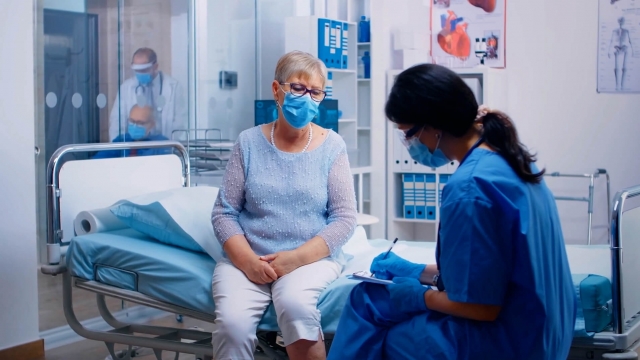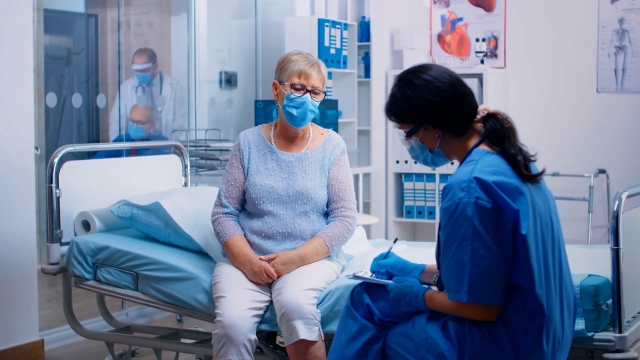David Carter was hailed a hero for rescuing two women during the 2017 Las Vegas mass shooting, but now he faces new challenges after he suffered a hand injury in a suspected hit-and-run last year and needed two surgeries. As medical expenses piled up, he grappled not only with physical pain but also financial strain.
"I lost everything I had; I lost my credit; I lost all my credit cards; I lost my money. Before I was the guy who could help anybody, now I'm the guy who don't have nothing, I'm just lost in the whole thing," David Carter told Scripps News.
23 million people in the United States owe medical debt. Three million owe more than $10,000 each.
"Medical debt is a huge problem in that it impacts residents' financial stability, their mental health, and their physical health," said Jennifer Holloway of the nonprofit legal aid organization Tzedek DC. "Having medical debt makes it more difficult to get a job or housing or obtain lines of credit. And it also means that many people cut back spending on food or other basic necessities. Medical debt is actually the leading cause of bankruptcy in the U.S. as well."
Going broke over medical debt is nearly unheard of in other developed nations, but some areas around the country have come up with what they think is a solution: the government is buying and canceling the debt. When a patient hasn't paid a medical bill in a while, the hospital will sell the debt to a private collection agency, often at a very steep discount. That collection agency will then pressure patients to pay, sometimes even for the full amount of the original bill. But some cities are now partnering with nonprofits that buy the debt for pennies on the dollar.
Instead of collecting on it, those groups just cancel the debt.
"Cook County has successfully acquired and erased nearly $80 million in medical debt," said Toni Preckwinkle, President, Cook County, IL Board of Commissioners. "We spent only a fraction of that, about 800,000 less than a million dollars, to do it. This will benefit over 72 thousand Cook County families, with many more to come."
Cook County, Illinois, will spend $12 million to eliminate as much as a billion dollars in medical debt for its residents.
Toledo, Ohio, used $1.6 million in federal funds to cancel up to $274 million in residents' medical debt.
Other jurisdictions canceling their residents debt include New Orleans, Louisiana, Pittsburgh, and Washington, D.C.
Holloway says like other local governments, D.C. has income qualifications, "which are up to 400% of the federal poverty line, or if the medical debt is 5% or more of your annual income, you're eligible for forgiveness without any application process."
SEE MORE: Human rights group criticizes lack of US hospital regulations on debt
An online poll of 1,500 Americans last year found 71% supported government efforts to relieve medical debt. Others, however, argue that it's inappropriate to use taxpayer dollars to cancel individuals' medical debts. When Connecticut Comptroller Sean Scanlon proposed recently that his state be the first to cancel medical debt, critics pounced.
"Scanlon gonna cancel medical debt and have taxpayers pick up the tab," one critic complained. "Please stop with the fiscal chicanery," wrote another. One even showed a photo of him with a dunce cap.
Beyond the debate over canceling debt, there's a more fundamental question: Why do Americans owe hospitals so much money in the first place?
"One of the primary causes of medical debt is lack of enrollment in comprehensive health care insurance," said Molly Smith, Vice President for Policy, American Hospital Association.
While we have done an incredible job of increasing the number of insured individuals over the last decade or so, we still have a fair number of Americans—about 8 or 9%—who aren't enrolled in any form of comprehensive health care coverage.
Some argue for a government-run health care program that would cover all Americans.
According to Holloway, "it would be an ideal solution to eliminate medical debt. But besides that, we can help end abusive debt collection, process debt collections through the court system by state and federal laws."
But should hospitals be providing more care at low or no cost, known as charity care?
60% of U.S. hospitals are nonprofit hospitals. The non-partisan Lown Institute estimates those institutions receive $30 billion in tax breaks each year.
The institute recently evaluated nonprofit hospitals for their community benefits. They found that three-quarters received more in tax breaks than the hospitals spent on charity care or other community benefits.
"Non-profit hospitals have not yet demonstrated that their activities are consistent with the charitable mission, so evidence suggests that tax exempt status does not provide assurance that non-profit hospitals will provide sufficient benefits," said Ge Bai, accounting professor at Carey Business School.
The American Hospital Association says the Lown Institute report underestimates all the different ways hospitals benefit their communities.
"The federal programs systematically underpay hospitals based on the hospital's costs. So the cost of tax-exempt hospitals has to make up for those shortfalls, but they also provide many more benefits than just financial assistance. Again, on their mission to promote health, because it's important for hospitals that they not only take care of people when they're sick, but they also try to keep them healthy," Mindy Hatton, General Counsel at the American Hospital Association, told Scripps News.
A recent report by theKaiser Foundation found that the U.S. spends more per capita on health care than any other nation. More than twice that of countries around the same size.
Trending stories at Scrippsnews.com




